When we find ourselves in times of financial hardship, it can overwhelm so many aspects of our life. Maybe you have debt that you’re trying to pay off, or your income has changed and you’re trying to make ends meet. There is no question that these financial situations can cause us stress if we’re unsure how to proceed. We not only become stressed about the future, we also become stressed about how we’ll manage to stay afloat right now. A recent poll conducted by the American Psychological Association (APA) found that stress and anxiety are on the rise among many Americans, and one of the areas found to produce the biggest increase in stress was finances. These feelings can be very isolating and can make it difficult to imagine that there is a way out of this phase of our life or that there is hope for a brighter tomorrow.
I know it can be hard, but it is important to remember that there is always hope – there are always steps that you can take to begin to make the improvements necessary to improve your financial footing.
Understanding where you are. When looking to improve your financial life, a great place to start is knowing your credit score. A recent Consumer Federation of America study highlights the importance of checking your credit score, as well as understanding the factors that go into creating your score. When you have this important piece of information, you’ll be on your way to understanding how to take the necessary steps to improve it!
Another way to gain a better understanding of your current financial situation is to take a look at your budget! Tracking your income and expenses will allow you to get a clearer picture of what money you have coming in and what money you have going out each month. Once you’ve tracked for the month, you’ll be able to figure out your income (the money you receive each month) and your expenses (the money you spent). Once you’ve calculated your income and expenses, you’ll be able to organize this information to help you better understand if there are some areas of your budget that you can adjust to help get you back on track.
Understanding what steps to take. Once you have a better understanding of your current financial situation, you’ll be able to identify some steps to take to help ease your current financial burden. For example, if you’re spending more than you’re making each month, take a look at your expenses and see what changes can be made. Are you able to reduce your expenses? Perhaps there are bills that may not be necessary right now, like movie and music streaming services, that can easily be stopped until you’re once again feeling comfortable enough to add these expenses back in. I know when I’ve hit times of financial strain, one of the ways I reduced my expenses was to stop ordering food in. I was able to drastically cut my expenses because I’d been spending so much throughout the month on takeout and delivery fees, and every little bit helped. It’s important to simply take a look at where your money is going, and to be honest with yourself about the changes that can be made.
If you’re working to pay down debt, another tip would be to work on paying down your higher interest debt first. This higher interest debt will end up costing you more money in the long run in interest fees, so focusing on paying it down first will help you save money while paying off your debt. If this is something that may benefit you, America Saves has some tips for you to begin paying off that higher interest debt.
Another step I’d recommend is to work on building emergency savings! It may seem counter-intuitive when you’re focusing on paying down debt and reducing expenses, but building a little cushion for financial emergencies will have a positive impact on both your stress and financial situation. Having a financial cushion will not only better prepare you for unexpected expenses, it will also prevent you from having to put more debt on a credit card you’re working to pay down. If you’re wondering how you can begin to build an emergency savings, I’d recommend doing so automatically!
Asking for help. Working to improve your financial situation can be overwhelming, and asking for help is an empowering step to take! A great place to start would be reaching out to your local Extension Office! Extension Educators across the state offer financially focused education and outreach that could be exactly what you need to get back on track. Locate your local Extension Office to see what services are offered and to be connected with other helpful resources where available. You may also want to look for other local agencies that offer free financial education, counseling, or planning to help you take control of your financial life. Pursuing financial education will provide you with the knowledge that can help you make the changes necessary for a brighter financial future.
Additionally, if your current financial situation is making you feel stressed or overwhelmed, talking to your friends and loved ones may help! A recent study from the APA highlighted that individuals who were able to reach out to someone for emotional support reported less stress.
Making yourself a priority. Because managing your finances can be a source of stress for many people, it’s important to remember to take care of yourself. If you’re feeling yourself becoming stressed or overwhelmed by everything, take some time to focus on you, making yourself and your health a priority. In fact, Anita Everett, M.D., the President of the APA believes that the recent poll showing increases in financial-related stress highlights a need for people to engage in activities like regular exercise, mindfulness, relaxation, and healthy eating to reduce the impact of stress on ourselves and our families.
No matter what the situation, you can do this! There is always hope to increase your financial security and make the changes necessary to live a financially healthy life. And when things get tough, just know that you’re not alone, and there are people and resources out there to help you through it!
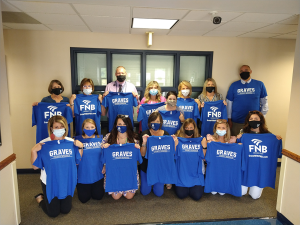 FNB Bank is proud to announce the sponsorship of Graves County School’s staff t-shirts for the 2021-2022 school year. The shirts were distributed to all employees of Graves County Schools to wear throughout the upcoming school year.
FNB Bank is proud to announce the sponsorship of Graves County School’s staff t-shirts for the 2021-2022 school year. The shirts were distributed to all employees of Graves County Schools to wear throughout the upcoming school year.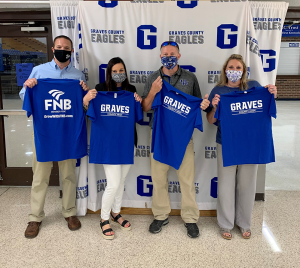 FNB Bank, founded in 1875, is one of the oldest banks in the state of Kentucky and ranks among the highest in the nation in the area of safety and soundness. FNB is a 2021 ‘Best Places to Work in Kentucky’ Small Business Category Award Winner. The bank currently has nine locations: Mayfield Main, Mayfield Southside, Wingo, Lone Oak, Paducah Midtown, Murray North, Murray South, Cadiz Main, and Cadiz West. FNB is member FDIC and an Equal Housing Lender.
FNB Bank, founded in 1875, is one of the oldest banks in the state of Kentucky and ranks among the highest in the nation in the area of safety and soundness. FNB is a 2021 ‘Best Places to Work in Kentucky’ Small Business Category Award Winner. The bank currently has nine locations: Mayfield Main, Mayfield Southside, Wingo, Lone Oak, Paducah Midtown, Murray North, Murray South, Cadiz Main, and Cadiz West. FNB is member FDIC and an Equal Housing Lender.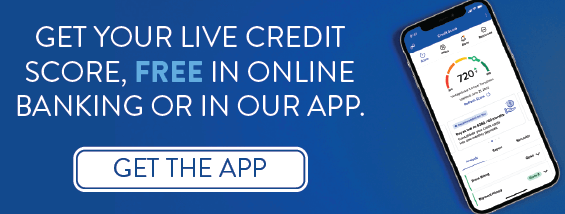


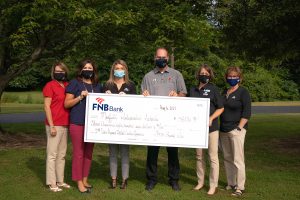 FNB Bank is proud to announce that they have donated over $24,000 back to Mayfield, Graves County and Trigg County Schools through their Spirit Debit Card Program. These donations to the school systems are a result of FNB’s 2nd quarter 2021 Spirit Debit Card Reward Program.
FNB Bank is proud to announce that they have donated over $24,000 back to Mayfield, Graves County and Trigg County Schools through their Spirit Debit Card Program. These donations to the school systems are a result of FNB’s 2nd quarter 2021 Spirit Debit Card Reward Program.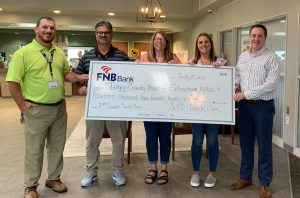 The FNB Spirit Debit Card Rewards Program allows FNB and their customers the opportunity to give back to their local schools when they use their FNB debit card. FNB currently offers Spirit Debit Cards for Mayfield, Graves County and Trigg County Schools. The Spirit Card works like a traditional debit card and for each signature-based transaction (not using your PIN), FNB donates $0.10 to the corresponding school. The tracking process is hassle free for the card holder, as FNB does all the tracking and submits the check to each school on a quarterly basis. The donated funds are utilized at the school’s discretion.
The FNB Spirit Debit Card Rewards Program allows FNB and their customers the opportunity to give back to their local schools when they use their FNB debit card. FNB currently offers Spirit Debit Cards for Mayfield, Graves County and Trigg County Schools. The Spirit Card works like a traditional debit card and for each signature-based transaction (not using your PIN), FNB donates $0.10 to the corresponding school. The tracking process is hassle free for the card holder, as FNB does all the tracking and submits the check to each school on a quarterly basis. The donated funds are utilized at the school’s discretion.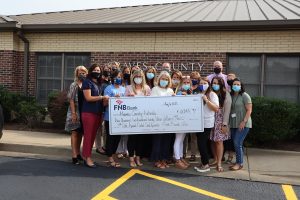 FNB Bank, founded in 1875, is one of the oldest banks in the state of Kentucky and ranks among the highest in the nation in the area of safety and soundness. FNB is a 2021 ‘Best Places to Work in Kentucky’ Small Business Category Award Winner. The bank currently has nine locations: Mayfield Main, Mayfield Southside, Wingo, Lone Oak, Paducah Midtown, Murray North, Murray South, Cadiz Main, and Cadiz West. FNB is member FDIC and an Equal Housing Lender.
FNB Bank, founded in 1875, is one of the oldest banks in the state of Kentucky and ranks among the highest in the nation in the area of safety and soundness. FNB is a 2021 ‘Best Places to Work in Kentucky’ Small Business Category Award Winner. The bank currently has nine locations: Mayfield Main, Mayfield Southside, Wingo, Lone Oak, Paducah Midtown, Murray North, Murray South, Cadiz Main, and Cadiz West. FNB is member FDIC and an Equal Housing Lender.
 Trice Seargent has 24 years of banking experience and currently serves as Retail Banking Manager for FNB. Trice is a 1988 graduate of Murray High School and a 1997 graduate of Murray State University where he obtained a Bachelor of Science degree in Organizational Communication. He currently serves on the Murray Main Street Economic Development Committee and volunteers with Murray’s Soup for the Soul program. Trice is also the Pastor of Murray Family Church. He resides in Murray with his wife, Kristen. They have three daughters: Allie, Bethany and Anna.
Trice Seargent has 24 years of banking experience and currently serves as Retail Banking Manager for FNB. Trice is a 1988 graduate of Murray High School and a 1997 graduate of Murray State University where he obtained a Bachelor of Science degree in Organizational Communication. He currently serves on the Murray Main Street Economic Development Committee and volunteers with Murray’s Soup for the Soul program. Trice is also the Pastor of Murray Family Church. He resides in Murray with his wife, Kristen. They have three daughters: Allie, Bethany and Anna. Jaclyn Burnett has 17 years of banking experience and currently serves as Compliance Officer for FNB. Jaclyn is a 2004 graduate of Murray State University with a Bachelor of Arts degree in Organizational Communication and Theatrical Arts. She completed ABA National Compliance School in 2016. Jaclyn attends Lone Oak United Methodist Church and resides in Paducah with her husband, David.
Jaclyn Burnett has 17 years of banking experience and currently serves as Compliance Officer for FNB. Jaclyn is a 2004 graduate of Murray State University with a Bachelor of Arts degree in Organizational Communication and Theatrical Arts. She completed ABA National Compliance School in 2016. Jaclyn attends Lone Oak United Methodist Church and resides in Paducah with her husband, David. Dawn Followell serves as Mortgage Sales Leader for FNB and has over 33 years of banking experience, with 21 years of experience in mortgage lending. She is a graduate of Massac County High School and attended Shawnee Community College and Paducah Community College with an educational focus in accounting and business. Dawn has formerly served as the President of the Paducah River City Business and Professional Women’s organization and is a graduate of the Leadership Paducah Class of 2000. She is a Certified Mortgage Loan Officer and has earned many prestigious honors for her dedication to her customers and performance. Dawn currently serves on Kentucky Housing Corporation’s Lender Liaison Committee. She also earned a Basic Underwriting Certificate from Mortgage Bankers Association. Dawn and her husband, Michael, currently reside in Paducah, KY and have two children, Kathryn and Emily.
Dawn Followell serves as Mortgage Sales Leader for FNB and has over 33 years of banking experience, with 21 years of experience in mortgage lending. She is a graduate of Massac County High School and attended Shawnee Community College and Paducah Community College with an educational focus in accounting and business. Dawn has formerly served as the President of the Paducah River City Business and Professional Women’s organization and is a graduate of the Leadership Paducah Class of 2000. She is a Certified Mortgage Loan Officer and has earned many prestigious honors for her dedication to her customers and performance. Dawn currently serves on Kentucky Housing Corporation’s Lender Liaison Committee. She also earned a Basic Underwriting Certificate from Mortgage Bankers Association. Dawn and her husband, Michael, currently reside in Paducah, KY and have two children, Kathryn and Emily. Jennifer Franklin has 16 years of banking experience and currently serves as Senior Operations Officer for FNB. Franklin is a 2005 graduate of Murray State University with a Bachelor of Science degree in Economics and Accounting. She also graduated from KBA General Banking School in 2014 and the Mayfield-Graves County Chamber of Commerce Leadership program in 2021. Jennifer resides in Mayfield with her husband, Cary. They have two children: Alexis and Lucas.
Jennifer Franklin has 16 years of banking experience and currently serves as Senior Operations Officer for FNB. Franklin is a 2005 graduate of Murray State University with a Bachelor of Science degree in Economics and Accounting. She also graduated from KBA General Banking School in 2014 and the Mayfield-Graves County Chamber of Commerce Leadership program in 2021. Jennifer resides in Mayfield with her husband, Cary. They have two children: Alexis and Lucas. David Jeffress has served as Chief Information Officer for FNB since 2017. David is a 2002 graduate of University of Tennessee at Martin with a Bachelor of Science degree in Computer Science. He also obtained a Master of Science degree in Information Systems from Murray State University in 2015. David resides in Murray with his wife, Jessica, and their children: Sagan and Nolan.
David Jeffress has served as Chief Information Officer for FNB since 2017. David is a 2002 graduate of University of Tennessee at Martin with a Bachelor of Science degree in Computer Science. He also obtained a Master of Science degree in Information Systems from Murray State University in 2015. David resides in Murray with his wife, Jessica, and their children: Sagan and Nolan. Tim O’Brien has over 24 years of banking experience and serves as Internal Auditor for FNB. Tim is a 1991 graduate of Paducah Tilghman High School and a 1995 graduate of Georgetown College where he obtained a Bachelor of Arts degree in History with a minor in English and Religion. He is a Certified Community Bank Internal Auditor through the ICBA. He is a graduate of Leadership Paducah – Class 32 and has volunteered with the Keys II program. Tim is a member of Broadway United Methodist Church and resides in Paducah. He has one daughter, Izabella.
Tim O’Brien has over 24 years of banking experience and serves as Internal Auditor for FNB. Tim is a 1991 graduate of Paducah Tilghman High School and a 1995 graduate of Georgetown College where he obtained a Bachelor of Arts degree in History with a minor in English and Religion. He is a Certified Community Bank Internal Auditor through the ICBA. He is a graduate of Leadership Paducah – Class 32 and has volunteered with the Keys II program. Tim is a member of Broadway United Methodist Church and resides in Paducah. He has one daughter, Izabella. Rusty Smith currently serves as BSA Officer for FNB and has 25 years of banking experience. Rusty is a 1988 graduate of Lone Oak High School and a 1993 graduate of Murray State University where he obtained a Bachelor of Science degree in Economics. He also obtained a Master of Science degree in Economics from Murray State University in 1995. He completed ABA Compliance School in 2002 and ABA Graduate School of Compliance Management in 2003. He was named an ICBA Certified BSA/AML Professional in 2019 and is a 2017 graduate of Leadership Paducah – Class 30. He previously served on the Child Watch Board of Directors from 2013-2019 and currently volunteers for the United Way of McCracken County PALS program and is involved with Airedale Terrier Rescue and Adoption programs. He is also an adjunct faculty member at West Kentucky Community and Technical College and Murray State University. He resides in Paducah with his wife of 20 years, Marjorie. They have 3 dogs and 7 cats.
Rusty Smith currently serves as BSA Officer for FNB and has 25 years of banking experience. Rusty is a 1988 graduate of Lone Oak High School and a 1993 graduate of Murray State University where he obtained a Bachelor of Science degree in Economics. He also obtained a Master of Science degree in Economics from Murray State University in 1995. He completed ABA Compliance School in 2002 and ABA Graduate School of Compliance Management in 2003. He was named an ICBA Certified BSA/AML Professional in 2019 and is a 2017 graduate of Leadership Paducah – Class 30. He previously served on the Child Watch Board of Directors from 2013-2019 and currently volunteers for the United Way of McCracken County PALS program and is involved with Airedale Terrier Rescue and Adoption programs. He is also an adjunct faculty member at West Kentucky Community and Technical College and Murray State University. He resides in Paducah with his wife of 20 years, Marjorie. They have 3 dogs and 7 cats.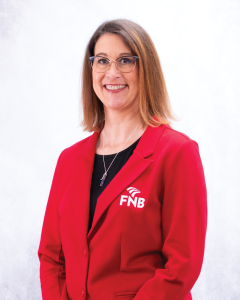 Scarlett Hamilton serves as Customer Support Manager and has over 10 years of banking experience. She is a 1995 graduate of Graves County High School and obtained an associate degree from Mid-Continent University in 2011. She also graduated from KBA General Banking School in 2020. She currently serves as the Vice President for CASA of Graves County & Southwest KY and is a member of Smith Street Church of Christ. She resides in South Fulton, TN with her husband, Eric. They have two children: Hunter and Rebecca.
Scarlett Hamilton serves as Customer Support Manager and has over 10 years of banking experience. She is a 1995 graduate of Graves County High School and obtained an associate degree from Mid-Continent University in 2011. She also graduated from KBA General Banking School in 2020. She currently serves as the Vice President for CASA of Graves County & Southwest KY and is a member of Smith Street Church of Christ. She resides in South Fulton, TN with her husband, Eric. They have two children: Hunter and Rebecca.

 FNB Bank is proud to announce that they have donated over $21,500 back to Mayfield, Graves County and Trigg County Schools through their Spirit Debit Card Program. These donations to the school systems are a result of FNB’s 1st quarter 2021 Spirit Debit Card Reward Program.
FNB Bank is proud to announce that they have donated over $21,500 back to Mayfield, Graves County and Trigg County Schools through their Spirit Debit Card Program. These donations to the school systems are a result of FNB’s 1st quarter 2021 Spirit Debit Card Reward Program. The FNB Spirit Debit Card Rewards Program allows FNB and their customers the opportunity to give back to their local schools when they use their FNB debit card. FNB currently offers Spirit Debit Cards for Mayfield, Graves County and Trigg County Schools. The Spirit Card works like a traditional debit card and for each signature-based transaction (not using your PIN), FNB donates $0.10 to the corresponding school. The tracking process is hassle free for the card holder, as FNB does all the tracking and submits the check to each school on a quarterly basis. The donated funds are utilized at the school’s discretion.
The FNB Spirit Debit Card Rewards Program allows FNB and their customers the opportunity to give back to their local schools when they use their FNB debit card. FNB currently offers Spirit Debit Cards for Mayfield, Graves County and Trigg County Schools. The Spirit Card works like a traditional debit card and for each signature-based transaction (not using your PIN), FNB donates $0.10 to the corresponding school. The tracking process is hassle free for the card holder, as FNB does all the tracking and submits the check to each school on a quarterly basis. The donated funds are utilized at the school’s discretion.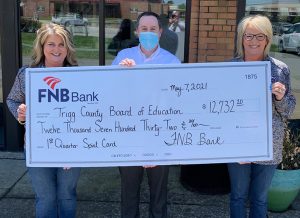 FNB Bank, founded in 1875, is one of the oldest banks in the state of Kentucky and ranks among the highest in the nation in the area of safety and soundness. FNB is a 2021 ‘Best Places to Work in Kentucky’ Small Business Category Award Winner. The bank currently has nine locations: Mayfield Main, Mayfield Southside, Wingo, Lone Oak, Paducah Midtown, Murray North, Murray South, Cadiz Main, and Cadiz West. FNB is member FDIC and an Equal Housing Lender.
FNB Bank, founded in 1875, is one of the oldest banks in the state of Kentucky and ranks among the highest in the nation in the area of safety and soundness. FNB is a 2021 ‘Best Places to Work in Kentucky’ Small Business Category Award Winner. The bank currently has nine locations: Mayfield Main, Mayfield Southside, Wingo, Lone Oak, Paducah Midtown, Murray North, Murray South, Cadiz Main, and Cadiz West. FNB is member FDIC and an Equal Housing Lender.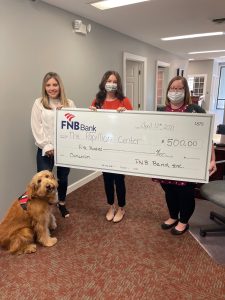 FNB recently made a $500 donation to The Papillion Center of Paducah. This donation will be used to assist with The Papillion Center’s mission to provide quality services and therapies for their clients.
FNB recently made a $500 donation to The Papillion Center of Paducah. This donation will be used to assist with The Papillion Center’s mission to provide quality services and therapies for their clients.